10 Best Legal AI Tools in 2025
What Are Legal AI Tools?
Legal AI tools are computer programs that use artificial intelligence (AI) and machine learning to help lawyers complete tasks efficiently. These tools include automated document creation, e-discovery, client communication, analytics, and case management. Law firms are quickly learning how to leverage legal workflow automation to provide fast and efficient service, stay ahead of their competition, and reduce repetitive tasks.
Why Do Law Firms Need Legal AI Tools?
A 2024 survey by Clio reveals that 79% of lawyers use AI for various legal tasks. From this insight, the legal industry appears to be adapting and making the shift to AI. It makes sense, considering how AI streamlines most aspects of law firm management.
AI tools for lawyers help:
- Save time from low-level, routine tasks. Use AI for legal work like summarizing documents, drafting contracts, analyzing deals, and legal due diligence.
- Aid in legal research. AI-powered legal research tools can quickly pull up relevant statutes, regulations, and precedents.
- Augment risk assessment. A few AI-powered tools can tap into streams of historical legal data to forecast potential outcomes, taking your risk assessment process to levels of efficiency.
How is AI Used in The Legal Industry?
AI legal tools automate basic and repetitive tasks that don’t necessarily require a lawyer’s experience and expertise, like responding to phone calls or drafting contracts. Some AI tools are also advanced enough to help with legal research, like e-discovery, regulatory compliance, and legal due diligence.
Apart from workflows within a law firm, artificial intelligence can also be used to simplify certain legal marketing activities, such as:
- Using generative AI tools to produce pieces for content marketing.
- Incorporating AI to refine audience targeting in advertising campaigns.
- Implement AI chatbots to cater to website visitors.
Zach Warren, Thomson Reuters Institute says, “Legal generative AI is supposed to augment what a lawyer does. It’s not going to do legal reasoning, not going to door case strategy. What it’s supposed to do is do repeatable rote tasks much more quickly and efficiently.”
The 10 Best Legal AI Tools
Here are the best legal AI tools to consider using for your law firm:
1. CoCounsel
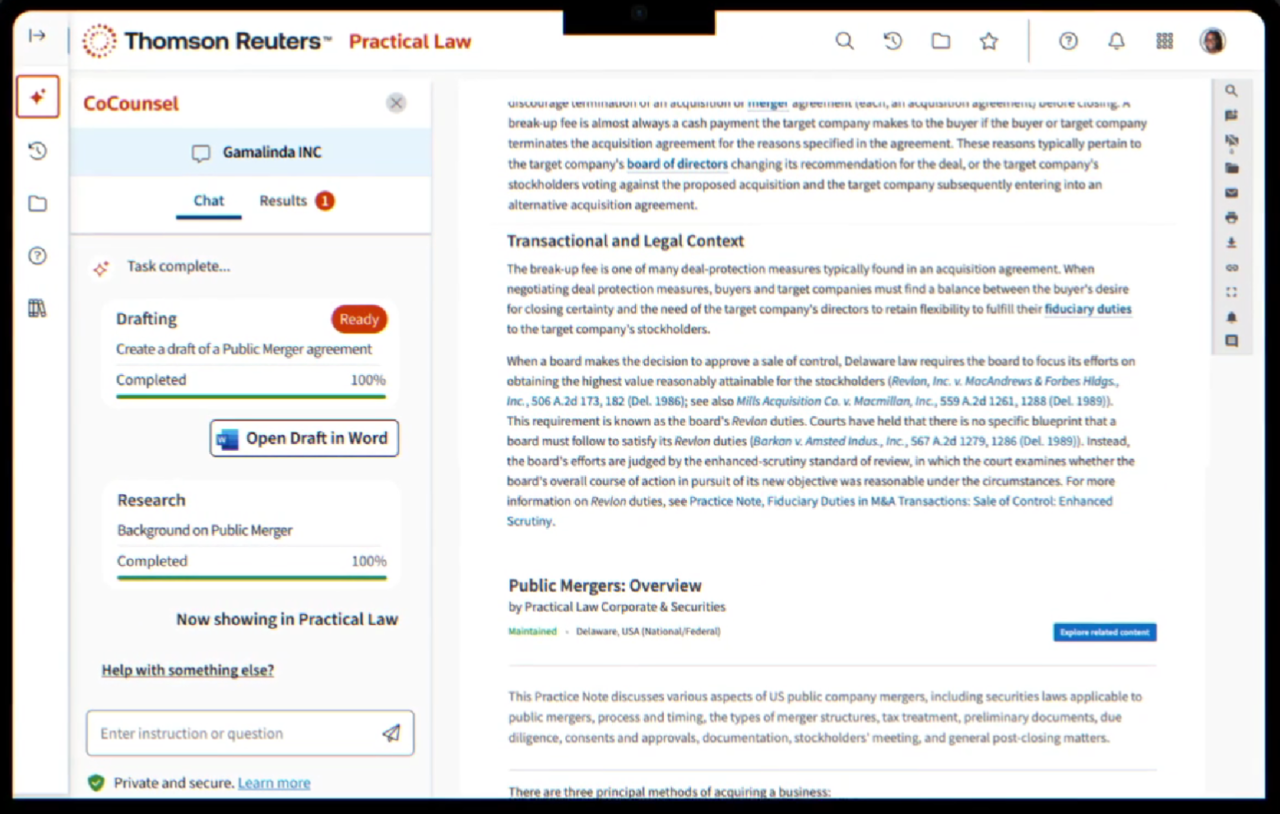
CoCounsel is an AI legal assistant that helps attorneys and those working in the legal industry write drafts, research cases, analyze contracts, identify relevant case law, and summarize long documents. It uses OpenAI’s GPT-4 generative AI technology to “answer” prompts and questions based on a given database.
Key features:
- Provide accurate citations to cases
- Assist with document and draft review
- Spot compliance issues in contracts
Price: Starts at $225/month
Pros:
- Easy to use
- Can copy and paste citations to documents
- More affordable compared to other apps
Cons:
- Contract drafting can be improved
- Lacks depth in creating outlines and summaries
2. ChatGPT
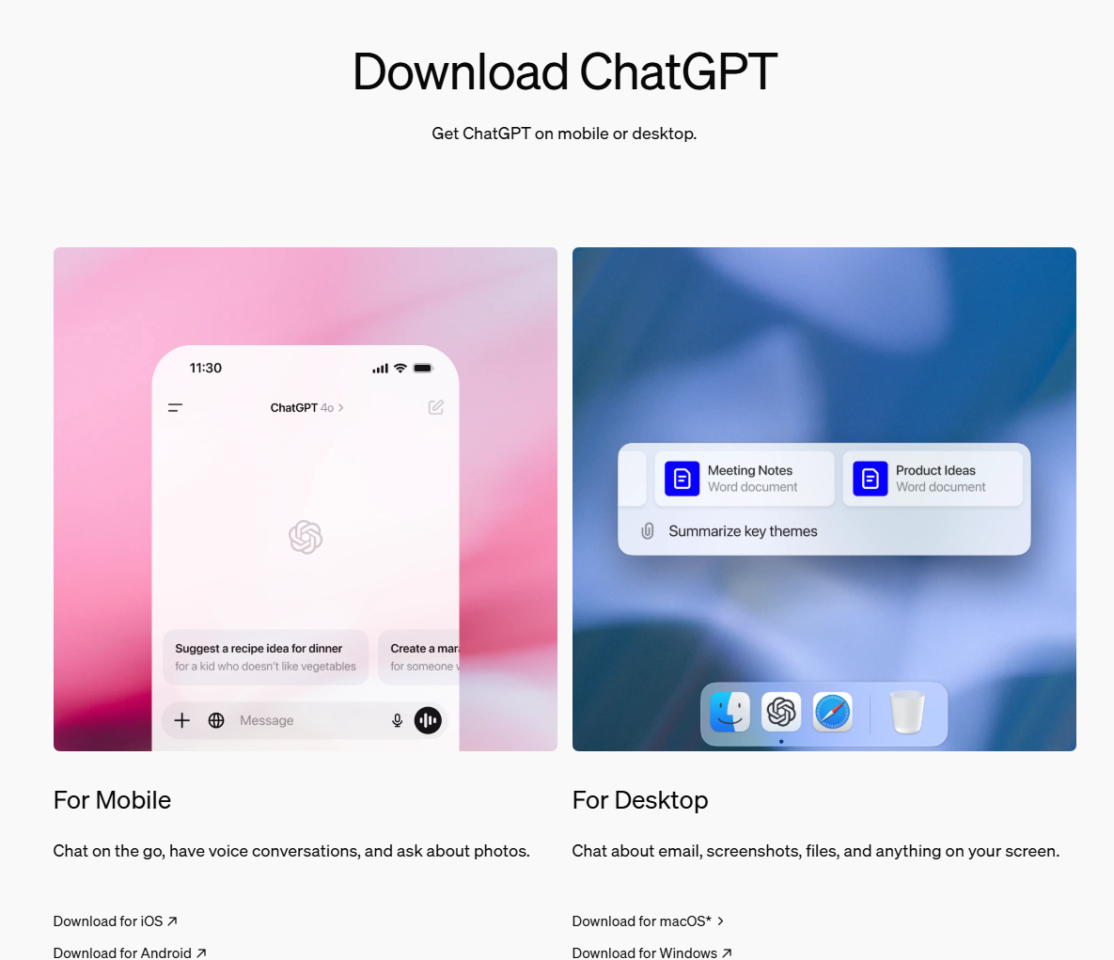
ChatGPT is a chatbot that can “answer” anything a user asks about using data gathered from the internet. It uses natural language processing, a technique that enables the software to understand prompts and respond appropriately as one would in a conversation.
Key features:
- Can handle multiple conversations
- Supports multiple languages
- Can analyze spreadsheets
- Supports voice commands
Price: Free; ChatGPT Plus: $20/month; ChatGPT Teams: $25 per user/month; Contact for Enterprise pricing
Pros:
- Fast responses
- Great for creating written content
- Versatile
- Has a free version
Cons:
- Inaccurate information
- Lack of nuance in some instances
3. Lex Machina

Lex Machina is a legal analytics software that combines AI and human reviewers to deliver insights on case outcomes and resolutions. The platform maintains an up-to-date database of cases needed to provide accurate analysis.
Key features:
- Advanced legal analytics
- Huge database of court rulings
- Provides outcome analytics
- Has API for integration with other systems
Price: Not provided
Pros:
- Makes legal research faster
- Intuitive interface
- Great for intellectual property lawyers
Cons:
- Pricing may not be suitable for solo lawyers or small firms
- Customer service needs improvement
4. Everlaw
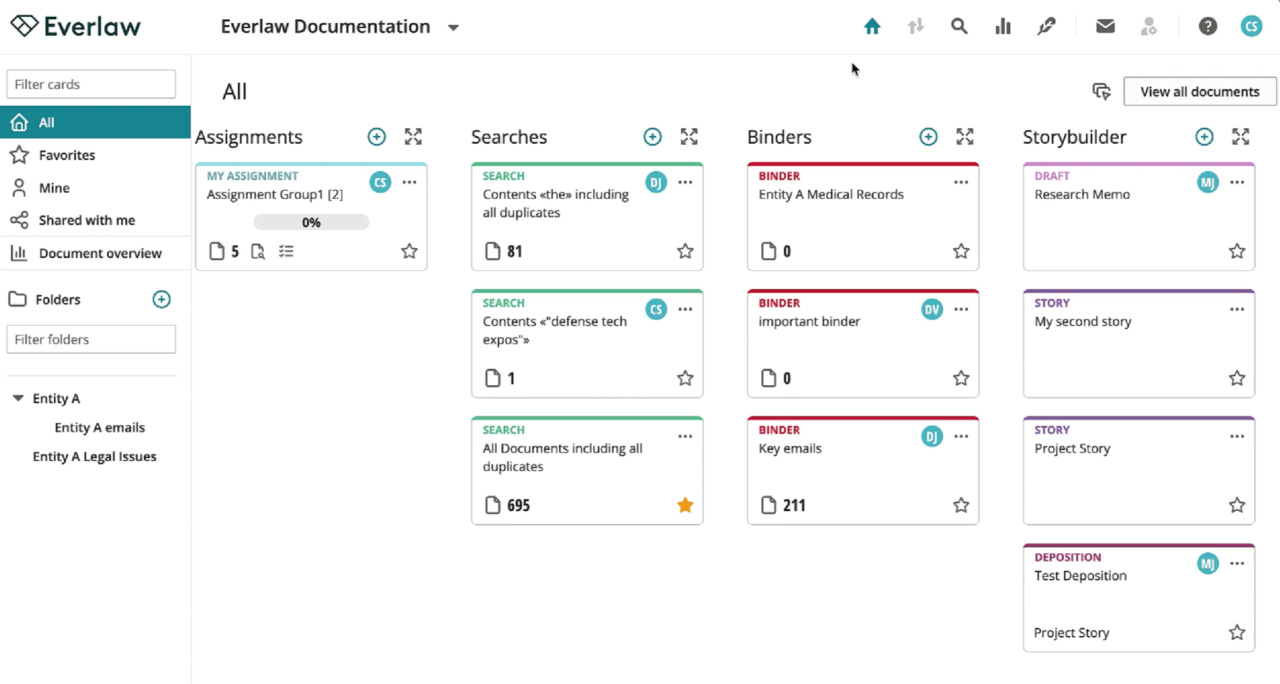
Everlaw is a cloud-native e-discovery and legal research tool for litigation attorneys and legal teams. Its main function is to help users find and review data used as case evidence. The platform claims to handle fast document processing (up to 90k documents per hour) to assist large-scale investigations.
Key features:
- Comprehensive e-discovery
- Advanced case analytics
- Deposition management
- Collaboration features
Price: Standard: $85 per user/month; Premium: $125 per user/month; Enterprise: Contact for pricing
Pros:
- Straightforward user interface
- Great customer service
- Customizable workflows
Cons:
- Issues handling large PDF files
- Some reports of technical glitches
5. Genie AI

Genie AI is an AI legal assistant that helps with drafting, editing, and reviewing legal documents such as contracts, letters, policies, and clauses. It allows for collaboration on documents and is compatible with most document formats.
Key features:
- Content writing
- Expert advice in various fields
- Real-time collaboration
- Document review and analysis
Price: Free; Basic: $7.99/month; Premium: $11.99/month; Enterprise: Contact for pricing
Pros:
- Ease of use
- Customizable templates
- Open-source access
Cons:
- Reported cases of biased information
- The search feature can be improved
6. Harvey

Harvey is a legal AI assistant that supports multiple legal tasks like drafting documents, analyzing contracts, gaining legal insights, and collaborating with team members.
Key features:
- Document analysis and review
- Legal research
- Multiple legal sources (EDGAR, EUR-Lex, Memos, French Case Law, etc.)
- Custom document creation
Price: Not provided
Pros:
- Fast response time
- Great document automation feature
- Can be customized to fit a specific law practice
Cons:
- Takes time to learn
- Too costly for small firms
7. PatentPal
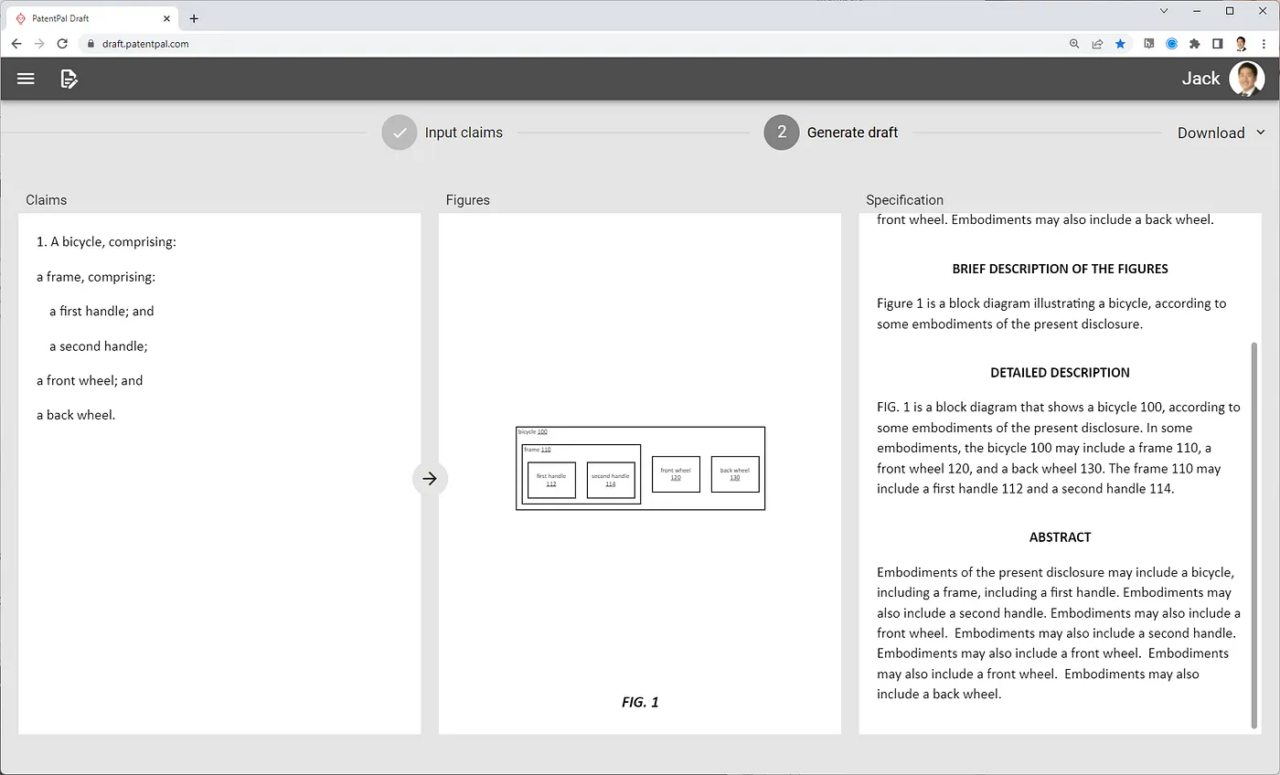
PatentPal is an AI-powered tool for drafting patent applications. It enables patent attorneys to quickly write and even automate drafts of patent applications, generating detailed descriptions, abstracts, claims, and figures.
Key features:
- Automated patent writing
- Generates content like diagrams from uploaded documents
- Customized generated phrases
Price: Not provided
Pros:
- Minimalist design for focused writing
- Flexible writing styles
- Can switch between multiple profiles
Cons:
- Takes time to learn
- Limited to patent documentation
8. Blue J
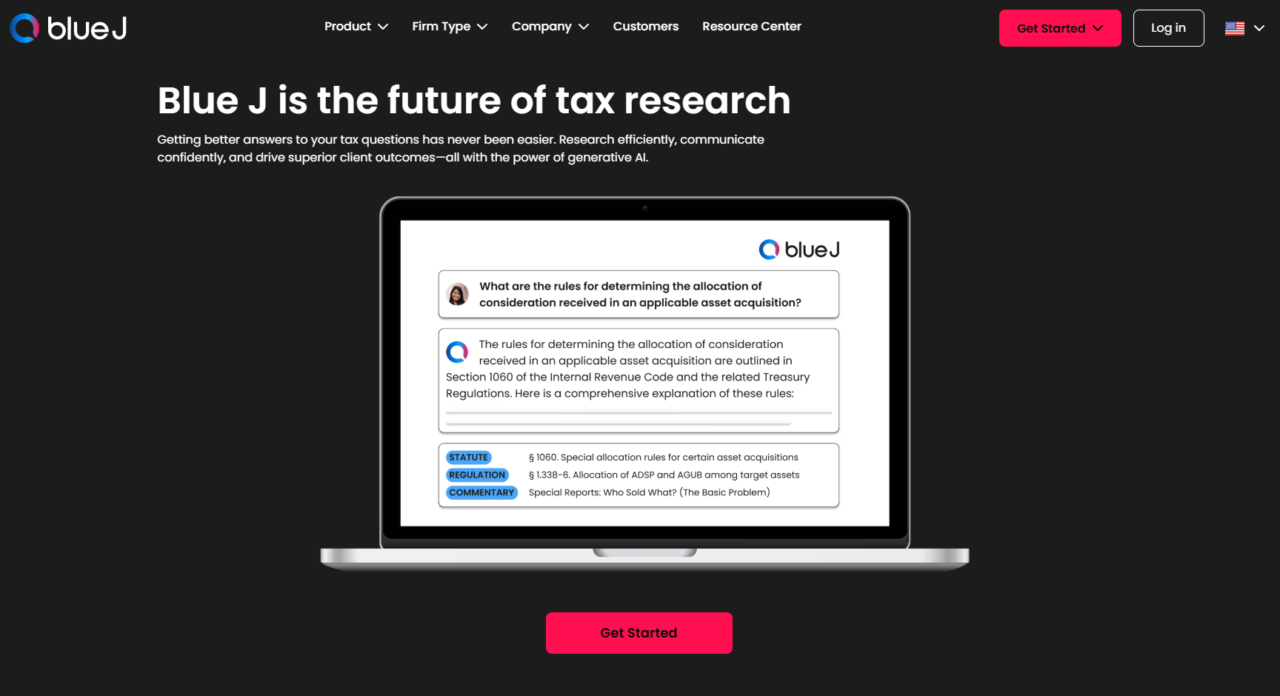
Blue J is a tax research tool powered by AI. It generates verifiable answers to questions about tax laws, helping tax attorneys and their teams get information in seconds and serve their clients.
Key features:
- AI-powered tax research
- Access to Tax Notes news and commentary
- Automated memo and email drafting
- Conversational responses
Price: $2495/year
Pros:
- More in-depth answers compared to other tax research tools
- Updated database
Cons:
- State tax law coverage can be improved
- Doesn’t offer tax calculation features
9. Diligen

Diligen is a legal software focused on reviewing and analyzing contracts and due diligence. It uses advanced algorithms to review legal documents and provide insights to help law firms and their teams make key decisions.
Key features:
- Contract analysis
- Automated document review
- Document sharing and collaboration
Price: Essential: $350/month; Professional: $500/month; Enterprise: $1600/month
Pros:
- Speeds up the contract review process
- Easy to navigate
- Understands clauses for different law practices
Cons:
- Doesn’t handle tax calculations
- Learning curve for advanced features
10. Ivo AI

Ivo (formerly Latch) is a Microsoft Word add-in that uses AI to help lawyers and legal professionals create legal documents like service agreements and contracts. It generates suggestions based on the requirements that you set.
Key features:
- AI-powered contract review
- Generates Issues List
- Works inside Microsoft Word
Price: Not provided
Pros:
- Accurate suggestions
- Integrates well with Google Docs and Adobe PDF
- Strong data privacy
Cons:
- Takes time to learn
- Doesn’t work without an internet connection
Which Law Firms Have Adopted Generative AI?
In February 2023, London-based law firm Allen & Overy announced an official partnership with Harvey AI after using the tool for their daily client work. Throughout the trial phase, Allen & Overy’s lawyers sent around 40,000 questions and prompts to streamline tasks like contract management, regulatory compliance, and due diligence.
Another note-worthy case study involves Austin-based construction litigation firm, Allensworth. The law firm turned to Everlaw and its generative functionality to accelerate tasks like data deduplication, document summarization, and e-discovery.
Lastly, The Right Law Group deployed Smith.ai to automate 95% of their lead generation funnel. And thanks to their AI-powered live chat tool, the firm was able to keep its intake channels open 24/7 — making sure that the growing firm had zero missed opportunities.
Parting Tips on Choosing The Right AI Tool For Your Law Firm
Remember the following when looking for an AI tool for your law firm:
- Understand your law firm’s specific needs. Evaluate your law firm to look for problems and bottlenecks that AI can solve, like manually reviewing contracts or missing calls due to the lack of intake specialists or receptionists.
- Investigate the developer’s track record. Be sure you choose an AI vendor that can provide your law firm with advancements and reliable support for years to come.
- Look into the AI tool’s security policies. Choose a platform that doesn’t keep or utilize sensitive legal information to train the AI model. It also helps to pick a company that’s transparent with their cybersecurity and data privacy protocols.
- Verify the required technical skills. Make sure that you have the manpower needed to successfully deploy the AI legal tech into your law firm’s processes.
- Request a demo. Most modern vendors offer virtual discovery sessions or demos to let you see firsthand what an AI solution can actually do for your law firm.
Another way to use AI for your law firm is for your marketing tasks. There are many use cases of AI for law firm marketing that you can leverage.
If you want tailored, human-led guidance, you can hire us to deliver digital marketing services for your firm. Contact us to get started.
Table of Contents
Related Articles
Dominate Your Market with Digital Marketing Services That Deliver
Talk to a certified professional today, and we will design a strategy specific to your case.






